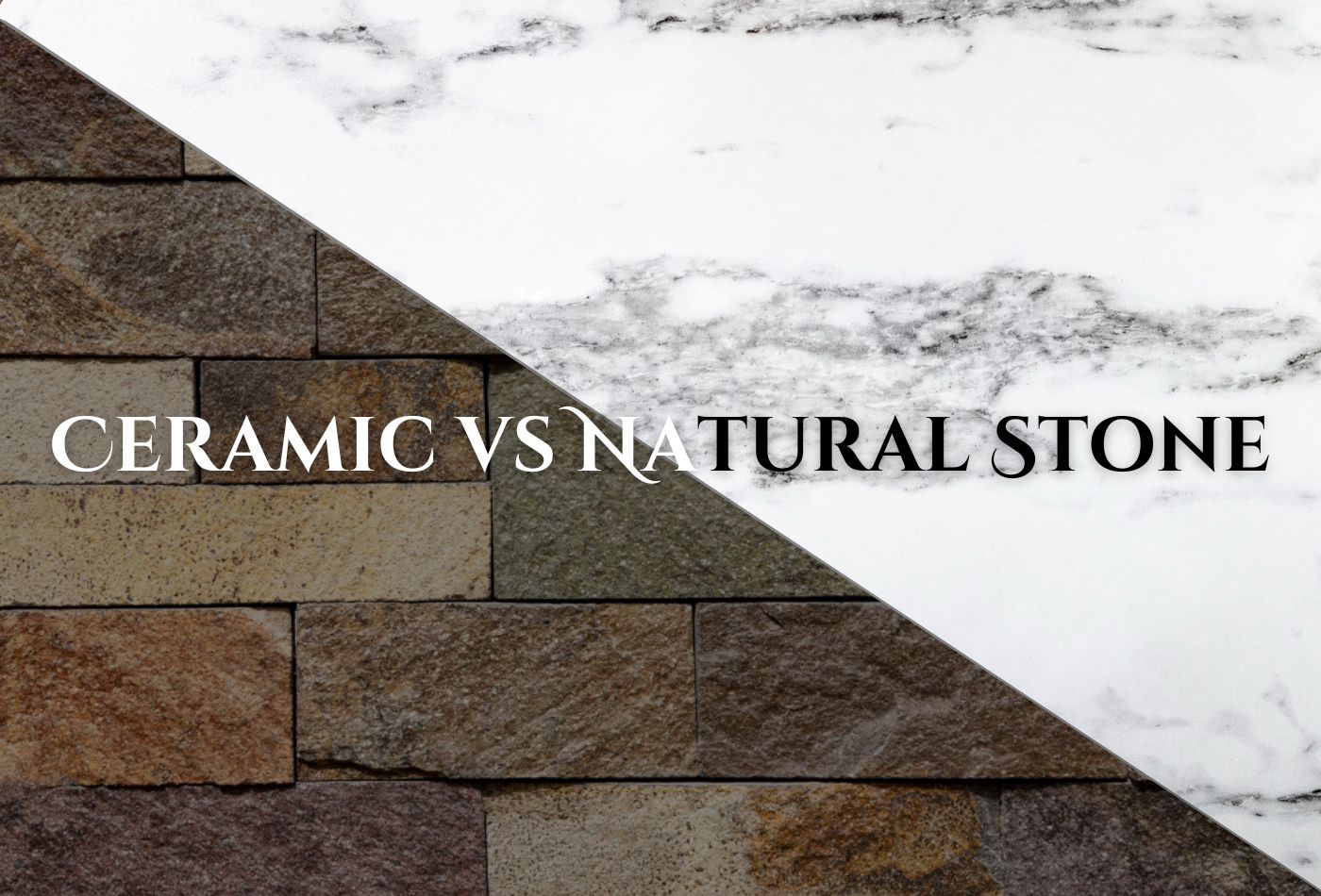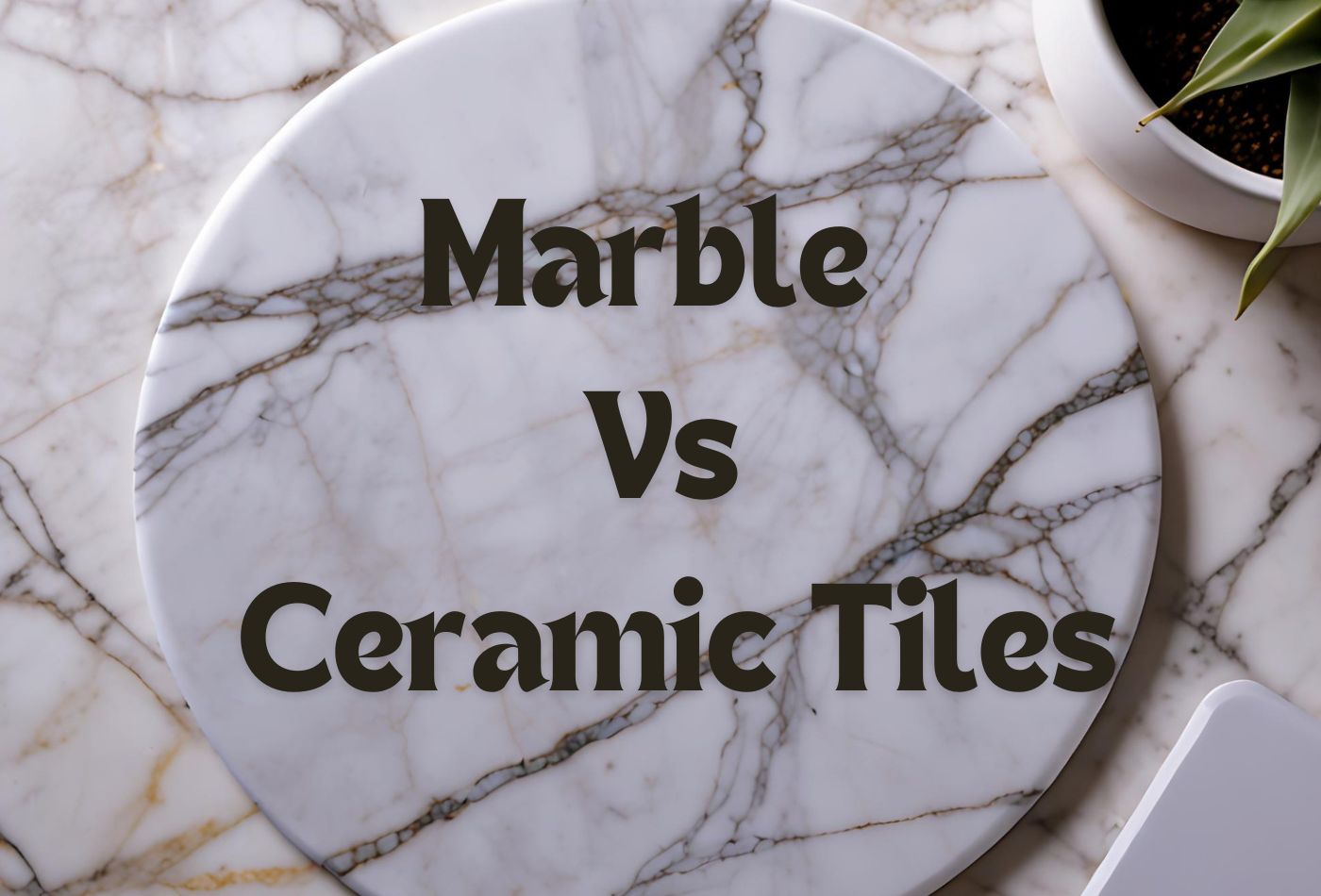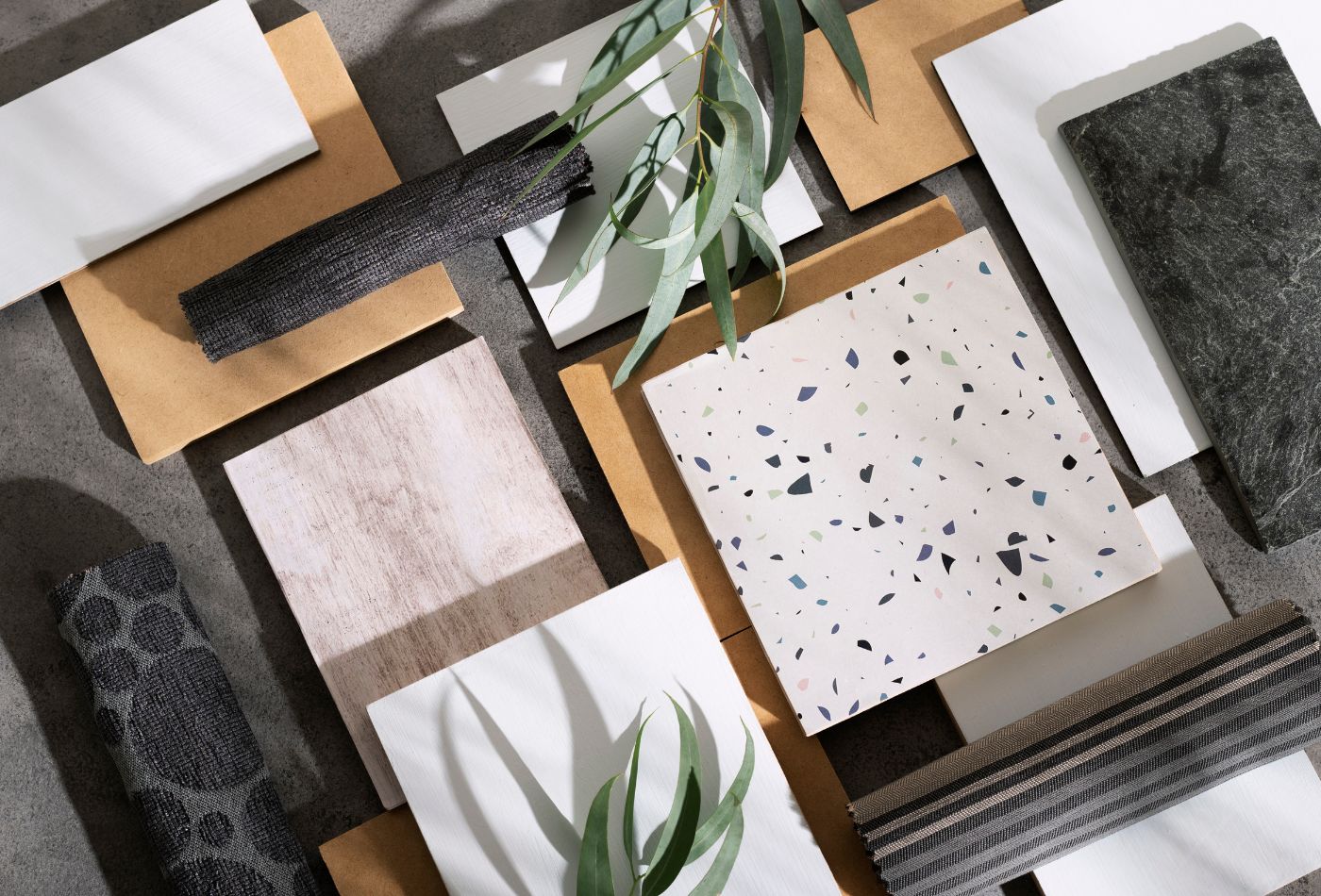Table of Contents
When choosing materials for your home, the debate between Ceramic vs Natural stone often arises. Both options offer beauty and durability, but they differ significantly in performance, appearance, and maintenance. Ceramic vs natural stone are affordable, versatile, and low maintenance, making them a popular choice for modern spaces. On the other hand, natural stone, like Granite or Marble, brings timeless elegance, unique patterns, and unmatched durability but often requires more care. Understanding the key differences between Ceramic and Natural stone can help you select the perfect material that balances style, function, and longevity for your home’s needs.
For more information, contact us on 0330 113 5868 or write to us at info@work-tops.com to get expert assistance.
Ceramic vs Natural Stone Tiles | A Quick Comparison

Durability
-
Ceramic: Strong but can chip or crack under heavy impact. Suitable for light to moderate foot traffic.
-
Natural Stone: Extremely durable, especially granite and slate, ideal for high-traffic areas.
Appearance
-
Ceramic: Offers uniform colour and design options, often mimicking stone or wood. Limited to manufactured patterns.
-
Natural Stone: Each tile is unique, with natural veining, patterns, and textures, adding a luxurious, organic touch.
Maintenance
-
Ceramic: Easy to clean and maintain, it often requires simple sweeping and mopping.
-
Natural Stone: It needs regular sealing and specific cleaning products to protect against stains and moisture.
Cost
-
Ceramic: It is more budget-friendly, making it a cost-effective solution for most homes.
-
Natural Stone: It is pricier upfront but adds long-term value and sophistication.
Installation
-
Ceramic: It is easier to install, lighter, and can be DIY-friendly.
-
Natural Stone: Heavier and more challenging to install, often requiring professional expertise.
Sustainability
-
Ceramic: It is manufactured from natural materials but with synthetic additives.
-
Natural Stone: 100% natural, eco-friendly, and recyclable.
CALACATTA LUXE CERAMIC
£532.70 The CALACATTA Luxe Ceramic slab is a premium white surface featuring striking grey veining that mimics the timeless beauty of Calacatta marble.Measuring 3200mm x 1600mm x 12mm, this large-format ceramic slab exudes luxury and sophistication.The glossy look will not only… read more |
ESTATUARIO CERAMIC
£521.90 The ESTATUARIO Ceramic slab integrates the esteemed WHITE MICRO MARBLE finish characterised by its pure white background with highly contrasted grey veins.The ESTATUARIO Ceramic slab offers a size of 3200 x 1600 x 12mm This polished ceramic slab is well… read more |
ZAHA STONE CERAMIC
£355.73 Zaha Stone Ceramic has a more classic grey tone with a luxurious silk finish, adding depth and modern elegance to any space.Large format slab with an impressive 12mm thickness, perfect for creating a seamless, high-end look.The silk finish gives a… read more |
Porcelain vs Ceramic vs Natural Stone
When choosing tiles, understanding the differences between Porcelain, Ceramic vs Natural stone is essential.
Porcelain tiles are known for their strength, water resistance, and versatility. They’re denser and more durable than ceramic, making them perfect for high-traffic areas and outdoor spaces. Porcelain is often available in a wide range of designs, even mimicking natural stone or wood textures, while being low-maintenance and long-lasting.
Ceramic tiles, though slightly less durable than Porcelain, offer great value and come in various colours and patterns. They’re best suited for light to moderate traffic areas, such as walls or low-use floors, and are easy to install and maintain, making them a popular choice for budget-conscious homeowners.
Natural stone like Marble, Granite, and Travertine exudes a timeless, luxurious appeal. Each stone is unique, offering one-of-a-kind patterns and textures. While it’s the most premium and durable option, natural stone requires regular sealing and specific care to preserve its beauty. It’s ideal for homeowners seeking an organic, high-end look, though it comes with a higher price tag and more complex installation.
Ultimately, choosing between Porcelain, Ceramic vs Natural stone depends on your space’s needs, budget, and style preferences.
Natural Stone vs. Ceramic Tile in the shower

When choosing between ceramic vs natural stone for a shower, both have distinct qualities.
Natural stone like Marble or Granite offers a luxurious, unique look, adding elegance to the space. However, it requires regular sealing and maintenance to prevent water damage and staining, making it more high-maintexnance in wet environments like showers.
Ceramic tile, on the other hand, is water-resistant, low-maintenance, and easy to clean, making it ideal for showers. It's more affordable and available in many designs, including those that mimic natural stone, offering a practical and stylish option with less upkeep.
Is Ceramic Natural Stone?
No, Ceramic is not natural stone. Ceramic tiles are artificial from clay and other natural materials, which are shaped, dried, and then fired in a kiln. This process creates a durable and versatile product with various designs and finishes. Ceramic tiles are often glazed, giving them a smooth, protective surface that resists stains and makes them easy to clean.
In contrast, natural stone tiles, such as Granite, Marble, and Limestone, are cut directly from quarries. Each type of natural stone has its unique characteristics, including texture, colour, and veining patterns, which result from geological processes. Natural stone tends to be more porous and may require sealing to maintain its appearance and durability. While both materials are durable and aesthetically pleasing, natural stone offers a unique, authentic look that ceramic cannot entirely replicate.
ICEBERG PORCELAIN
£395.01 Imagine Iceberg Porcelain resembles a winter landscape captured in a slab of Porcelain. Its keen white surface resembles freshly fallen snow so white and pure, while delicate veins of purple and dark black meander across like enchanting frozen streams. These… read more |
CALACATTA BORGHINI BOOKMATCH MARBLE
£1,083.50 Calacatta Borghini Bookmatch Marble is a type of marble known for its luxurious appearance and elegant white background with striking grey veining. When bookmatching Calacatta Borghini marble, two slabs are cut from the same block and then opened like a… read more |
JURA BEIGE LIMESTONE
£266.75 Jura Beige Limestone is a beige sandstone from Germany notable for its hardness and richness of fossils. the traditional colour of Jura Limestone This product is mostly used for interior floors and staircases. The limestone's hardness and density allow it… read more |
Natural Stone vs Porcelain
When comparing natural stone to porcelain, both offer distinct advantages.
Natural stone, such as Marble, Granite, or Slate, brings unique, organic beauty to any space. Each stone has its natural veining and texture, providing a one-of-a-kind look that adds luxury and character. However, it requires regular sealing and specialised care to protect against stains and moisture, making it a higher-maintenance option.
Porcelain, on the other hand, is an artificial material known for its strength, durability, and low maintenance. It’s highly resistant to scratches, water, and stains, making it perfect for high-traffic areas and outdoor use. Porcelain can also mimic the look of natural stone, offering a cost-effective and practical alternative without the upkeep.
In summary, natural stone offers timeless beauty and uniqueness, while Porcelain provides durability, affordability, and easier maintenance, making it ideal for busy spaces.
Difference Between Stone and Ceramic

When choosing between ceramic vs natural stone, it’s crucial to understand their distinct characteristics to find the perfect fit for your space.
Stone tiles, like Granite, Marble, and Limestone, are nature’s artwork, each piece uniquely crafted over millennia. Their natural beauty and varied textures create a timeless, luxurious look that adds elegance and value to any room. However, they can be porous and may require regular sealing to protect against stains and moisture.
Ceramic tiles are engineered from clay and other natural materials, shaped and baked in kilns. This process allows for a vast range of colours, patterns, and finishes, making ceramic tiles incredibly versatile and often more affordable. They are typically glazed, offering a smooth, stain-resistant surface that’s easy to maintain. While they lack the unique, organic patterns of natural stone, ceramic tiles can mimic the appearance of stone and other materials, giving you flexibility in design without compromising on durability.
In essence, choose stone for its authentic, luxurious appeal or ceramic vs natural stone for its affordability, versatility, and ease of maintenance.
Summary
In conclusion, ceramic tiles offer affordability, ease of maintenance, and a wide variety of designs, making them practical for most homes. Natural stone tiles provide unmatched beauty, durability, and uniqueness but require more care and a higher investment. Your choice depends on budget, maintenance preferences, and the desired aesthetic for your space.
P.s. The readers are informed that none of the content available on any of the pages of Work-tops.com should be taken as legal advice and that Work-tops will not be held accountable for your use of the information contained in or linked from these web pages.




